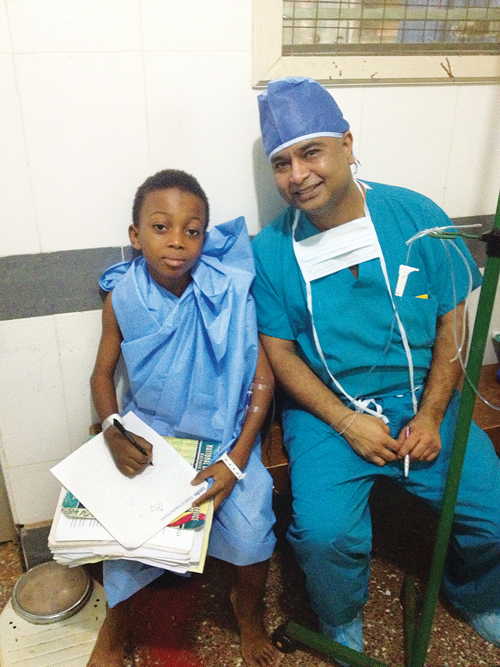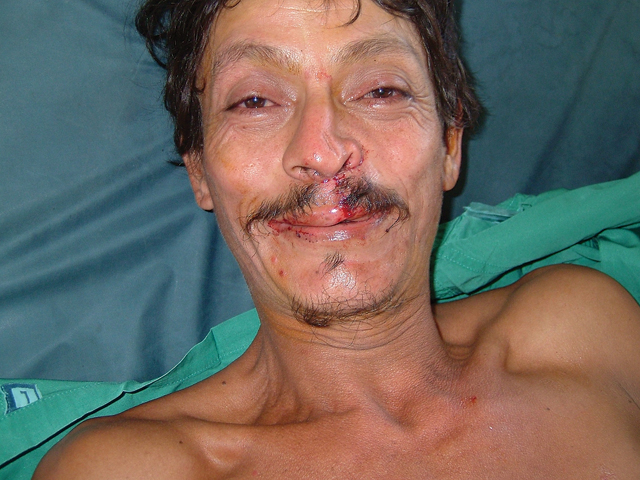Riverhead doctor on a mission to save lives across the globe


•
Each spring, members of ISMS’ New York team use money collected through fundraisers, private donations and organizations like Riverhead Rotary to travel to hospitals where an urgent need for their services has been identified. In the course of two weeks, the medical professionals — who include general surgeons, reconstructive plastic surgeons, obstetricians and gynecologists and registered nurses — perform as many operations as possible. More recently, the organization added a second objective: donating medical equipment and supplies to the hospitals they visit and teaching local surgeons there lifesaving techniques, such as proper wound care.
Education about wound care is particularly important in developing countries. On a 2011 trip to Kenya, for example, Dr. Patel said he routinely saw patients with open wounds sharing beds while stray dogs and cats roamed the hospital’s hallways.
“The extent of wound infections in these places is terrible,” he said, adding that the problem can be largely attributed to overburdened doctors and a profound lack of resources.
“The patients are left to fend on their own,” Dr. Patel continued. “Here, you ask a nurse for a small bandage and they’ll give you five. Over there, they’ll have one bandage, cut it into two pieces and then share it.”
As someone who specializes in pulmonary medicine and critical care with ISMS, Dr. Patel is tasked with caring for pre-operative patients, determining whether they’re healthy enough for surgery. Afterward, he helps care for them in the recovery room.
In 2014, ISMS doctors successfully operated on a 12-year-old boy from Ghana whose enlarged spleen weighed as much as a newborn baby. In a video posted on the organization’s YouTube page, Dr. Patel discussed the experience.
“[The boy] was so grateful that we were here, he was praying for us,” he said in the mini-documentary, visibly moved. “For us!”
Last year, Dr. Patel traveled to Myanmar, where his team performed 65 major surgeries, including the removal of a grapefruit-sized tumor from a woman’s jaw. With the support of Riverhead Rotary members — namely, Jack Van de Wetering and the late Steve Patterson, Dr. Patel said — ISMS was able to leave behind $150,000 worth of medical equipment to upgrade the local hospital’s operating room, recovery room and intensive care unit.
Mr. Patterson’s wife, Sherry, said she can’t think of anyone who better epitomizes Rotary International’s core tenet of service above self than Dr. Patel and ISMS.
“I can only say that this award is well-deserved and I am honored to know him,” said Ms. Patterson, past Riverhead Rotary president and chairwoman of PBMC’s board of directors.
The Douglas MacRae Peace Award is actually just the latest in a string of honors for ISMS. In 2015, East End Hospice awarded Dr. Patel — an EEH board member — and ISMS its Good Samaritan of the Year Award. And earlier this year, ISMS was designated a United Nations-affiliated non-governmental organization.
“That’s a lot of pressure,” Dr. Patel said with a laugh. “A lot of pressure. We can’t mess up now.”
That doesn’t seem likely. In March, the ISMS team from New York team plans to travel to the Philippines, where they hope to provide care to patients in Davao City. In addition, Dr. Patel said, ISMS is trying to raise money to expand a hospital in Ghana, where they volunteered in 2012.
It’s dizzying to think about finding enough time in the day to do so much good. But Dr. Patel, who works 12-hour days and volunteers at East End Hospice’s Camp Good Grief in his spare time, said he’s motivated by the fact that ISMS is “changing somebody else’s life in a positive way.”
To illustrate his point, he recalled a 2006 mission to Nicaragua during which ISMS physicians repaired the cleft lip of a 42-year-old man. International charity organizations routinely perform such surgeries on children, but this patient had seemingly escaped their notice.
“This poor man, his entire life, had never smiled,” Dr. Patel said.
On the final day of their mission, the ISMS team performed the relatively uncomplicated surgery. Afterward, Dr. Patel and his colleagues held a mirror to the man’s face and encouraged him to take a look at himself.
The man didn’t know how to smile, but he did his best.
“And I have to tell you … that smile? That was a Kodak moment,” Dr. Patel said.










